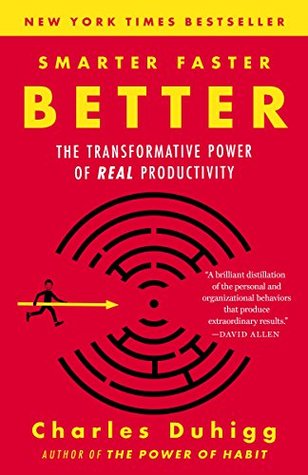More on this book
Community
Kindle Notes & Highlights
Read between
September 16 - October 9, 2019
Productivity, put simply, is the name we give our attempts to figure out the best uses of our energy, intellect, and time as we try to seize the most meaningful rewards with the least wasted effort.
Productivity isn’t about working more or sweating harder. It’s not simply a product of spending longer hours at your desk or making bigger sacrifices. Rather, productivity is about making certain choices in certain ways. The way we choose to see ourselves and frame daily decisions; the stories we tell ourselves, and the easy goals we ignore; the sense of community we build among teammates; the creative cultures we establish as leaders: These are the things that separate the merely busy from the genuinely productive.
Motivation is triggered by making choices that demonstrate to ourselves that we are in control. The specific choice we make matters less than the assertion of control.
The choices that are most powerful in generating motivation, in other words, are decisions that do two things: They convince us we’re in control and they endow our actions with larger meaning.
Psychological safety is a “shared belief, held by members of a team, that the group is a safe place for taking risks.”
There were, however, two behaviors that all the good teams shared. First, all the members of the good teams spoke in roughly the same proportion, a phenomenon the researchers referred to as “equality in distribution of conversational turn-taking.”
Second, the good teams tested as having “high average social sensitivity”—a fancy way of saying that the groups were skilled at intuiting how members felt based on their tone of voice, how people held themselves, and the expressions on their faces.
A high need for closure has been shown to trigger close-mindedness, authoritarian impulses, and a preference for conflict over cooperation.
an instinct for decisiveness is great—until it’s not. When people rush toward decisions simply because it makes them feel like they are getting something done, missteps are more likely to occur.
“You get into this mindset where crossing things off your to-do list becomes more important than asking yourself if you’re doing the right things,” said Latham.
Numerous academic studies have examined the impact of stretch goals, and have consistently found that forcing people to commit to ambitious, seemingly out-of-reach objectives can spark outsized jumps in innovation and productivity.
Good decision making is contingent on a basic ability to envision what happens next.
“Creativity is just connecting things,” Apple cofounder Steve Jobs said in 1996.
When we encounter new information and want to learn from it, we should force ourselves to do something with the data.
Forcing ourselves to explain why we are doing something helps us remember that this chore is a step along a longer path, and that by choosing to take that journey, we are getting closer to more meaningful objectives.
If you can become more motivated, more focused, better at setting goals and making good decisions, then you’re a long way down the path to becoming more productive.


